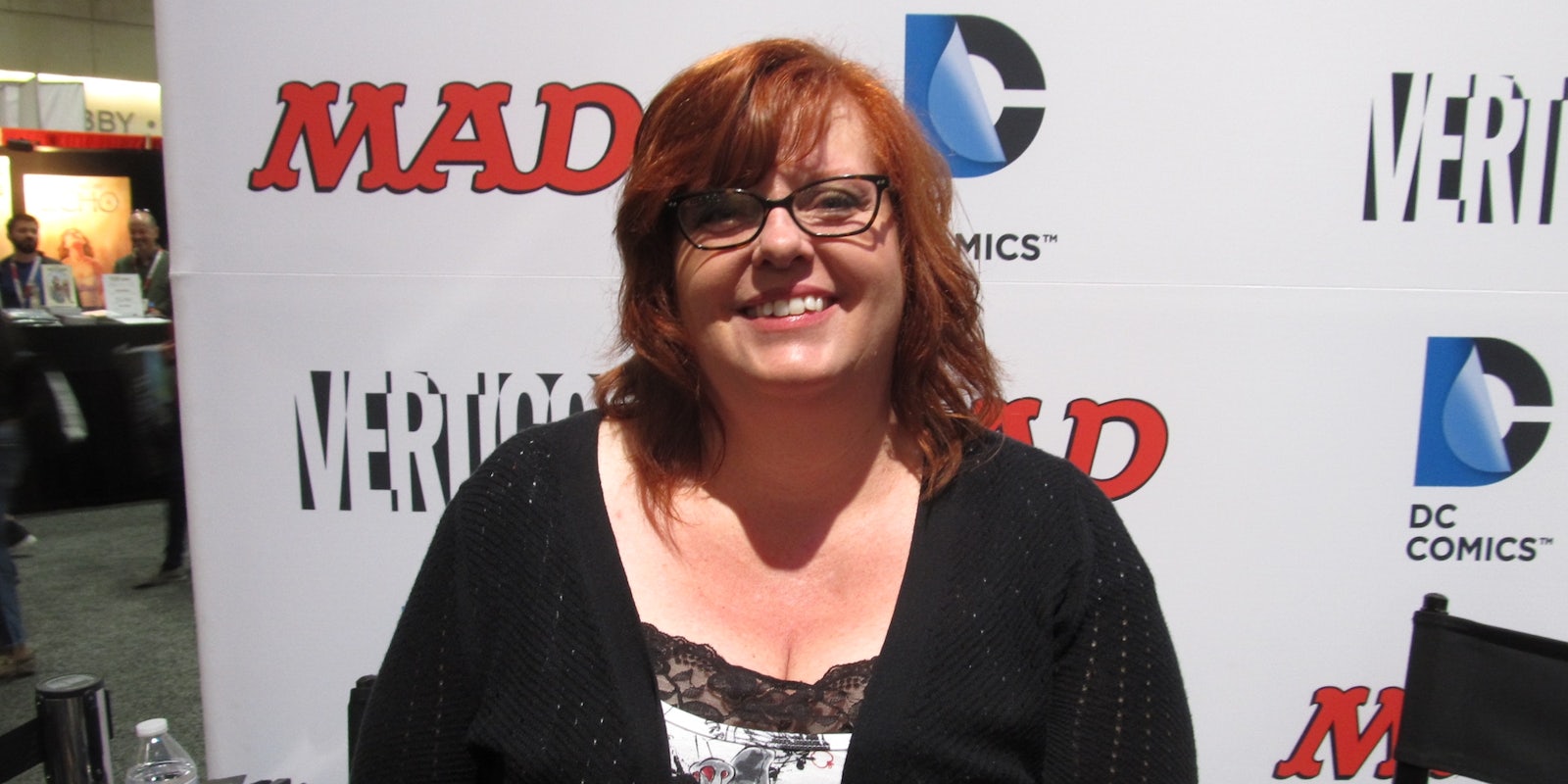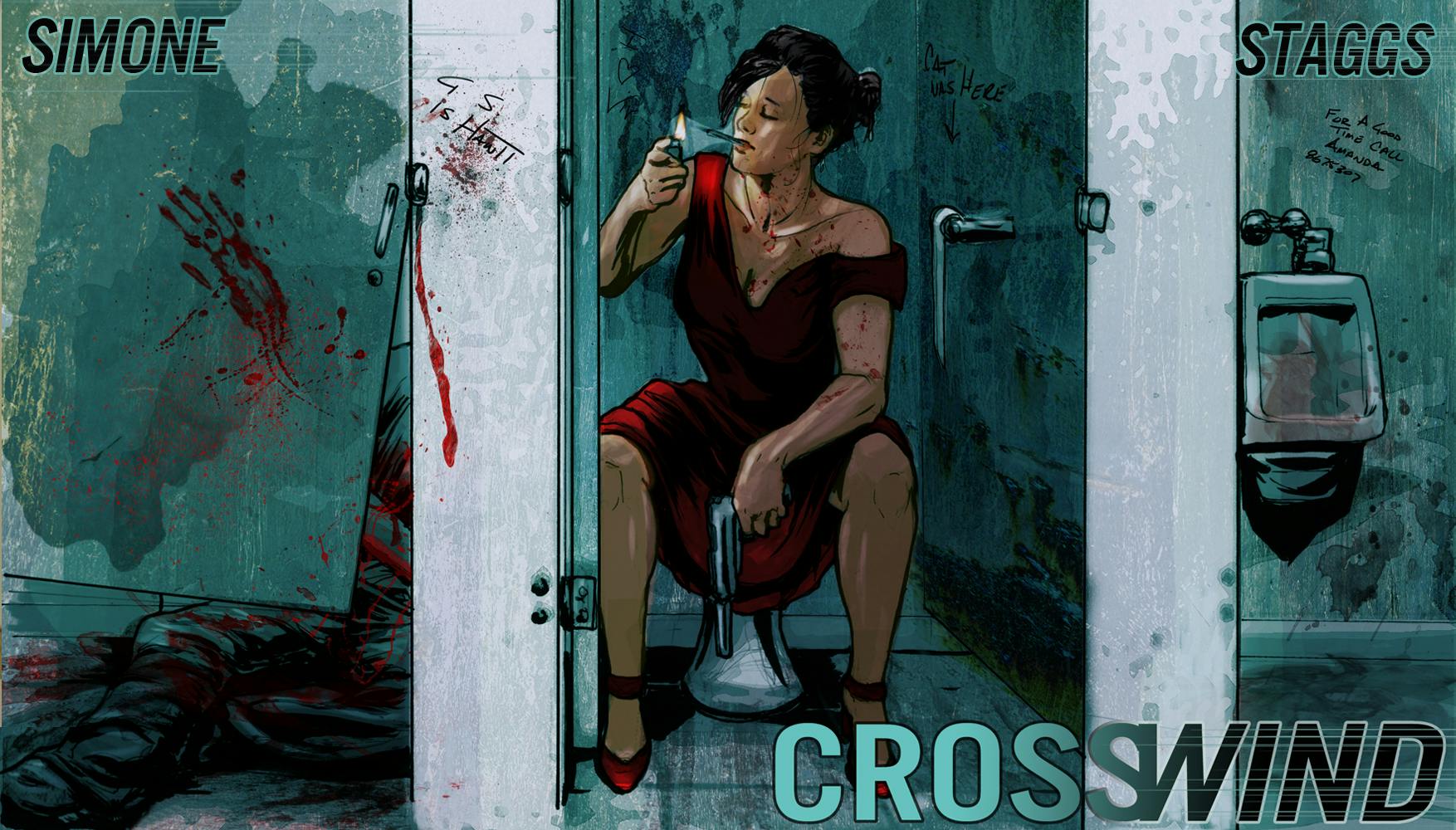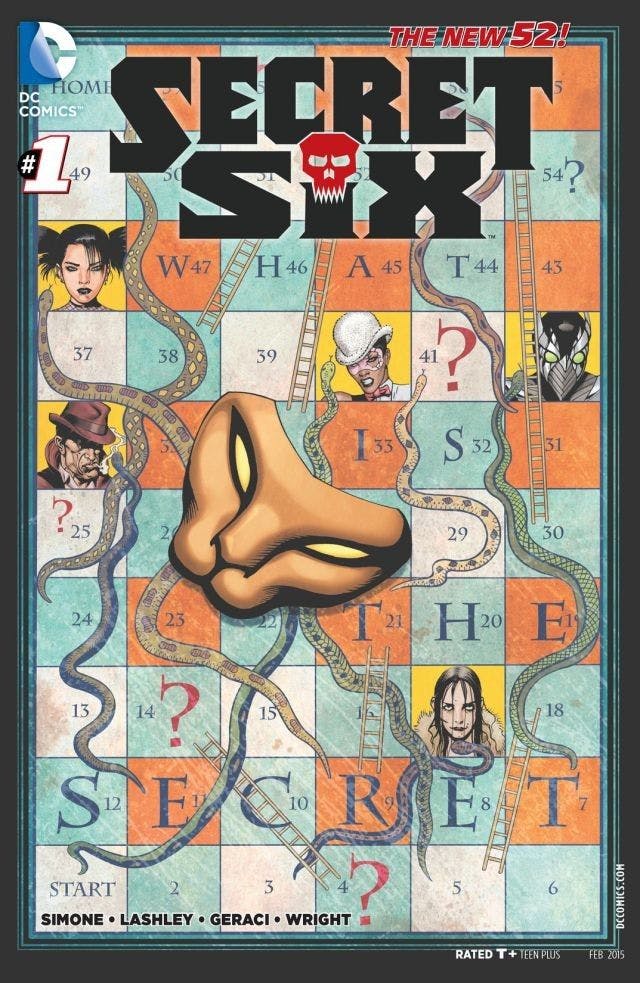Gail Simone is more than just a legendary comics writer. As the creator of the Women in Refrigerators website and the originator of the term “fridged women,” she’s long been a beacon for an underrepresented faction of women in comics who demand better things from the media they consume.
But the evolution of female-dominated fandom into wider geek culture, and geek culture into the mainstream, has meant a rapidly increasing awareness of social issues in comics—along with a giant influx of new comics fans. DC Comics‘ new “DC You” line of mini-series reflects a groundbreaking new emphasis on diversity from both DC and Marvel. Meanwhile, creators including Simone are testing the waters of independent comics with creator-owned comics—like her recently announced Image title Crosswinds.
Simone, who began writing DC’s Secret Six last year after turning over her much-lauded run of Batgirl, has always been one for breaking the mold. As the current writer for Dynamite’s Red Sonja, she’s no stranger to darker works with strong heroines at the helm. And as she told us last year, Secret Six contains plenty of unexpected elements, both in terms of mood and character.
At Comic-Con last week, against a backdrop of promises from DC to commit to even more diversity in the DC Universe, we tracked Simone down to discuss the new trend and where her upcoming works will fit in.
How did you get the idea for Crosswinds?
[Laughs] Ideas are not—ideas come at me all the time, it’s just the way I’m wired. It’s just a matter of focusing it in and figuring out what to do with that. I just thought that it’d be really interesting to tell a story where these people are switching complete lives, and they’re just thrown into it, into a do-or-die situation.
How do you feel Secret Six fits into the new “DC You,” and the integration of the diverse short series with the main titles?
Secret Six has always had a special place in the DCU, just because they’re the misfits. The content is a little bit different than the rest of the mainstream titles. It has a completely different tone than any of the other books out there. It’s a good home for Strix and Black Alice, and some of those characters that I think belong in a Secret Six book rather than some of the other titles.
With all the new creators coming aboard and the emphasis on plucking side characters out of the ether and giving them their own book, what kinds of new titles and characters are you excited to see in this new phase?
I’m kind of excited to see the Poison Ivy mini, for one thing. And to tell you the truth, to break it down a little bit, I’m just really excited that we can have this many titles that can attract this wide of an audience. Because we’ve got things, especially if you want to include Vertigo, it goes all the way from very adult material to all ages and below that as well. [Editor’s note: the day of this interview, Vertigo announced a new line of titles, including a confirmed release date for a long-planned horror series from Simone, Clean Room.] I think that’s really, really exciting, and something I’ve wanted to see for a long time—to see this audience grow and include everyone, and have material that everyone can enjoy. I find that really exciting, really refreshing. I think the industry is growing up and catching up with the world—finally! Which is very exciting to me, to have it open up like that and welcome in new readers, and you don’t have to have read 70 years of material to get in and really enjoy these characters.
That’s what I’m excited about, on top of it being available on many different platforms. Because people in big cities don’t realize that people in small cities don’t have a comic store. And so digital is something that’s just really—for people who are from an area like I’m from, it’s just amazing. And I just got back from Shanghai—100 percent digital there. So, you know, to think you can reach people clear across the world now, it’s quite extraordinary, and I’m just excited. They can find material that they like on a huge scale.
In the press breakfast this morning, Dan DiDio said something that struck me as odd. He was discussing the dichotomy of print vs digital and the diversity of the mini-series versus the core titles. He said, “We can have it all”—but you need diversity in the core series, too, it can’t just be ‘diversity over here’ and ‘core series over there!’ And I know that DC has done a lot recently, with things like giving Midnighter his own series, affirming Constantine’s bisexuality—a lot of things have shown up in the core series that are good and positive. But I wonder if you have any thoughts on how, in addition to all this, we can continue to diversify the core series that we love.
When you have these characters who’ve been around 70-plus years, they’re going to need to be malleable, they’re going to need to change and fit in with the times. For instance some of our female characters were amazing pro-active characters in the beginning, and then we went through this period where they really weren’t, because society was that way, after World War II. And then we kind of are swinging back now. But, what I love about now is, it’s OK to have this diversity, people want it, they’re speaking out about it, it’s not taboo anymore. We’ve broken down the barriers that say, ‘If you put this in a comic it won’t sell, people are going to boycott the company, and all this stuff.’ We’ve broken that down, it’s not happening, it’s actually bringing in more readers.
And we’re seeing that in the incremental growth that we’re having in this industry that other industries are not having. And I choose to believe that that is because we are welcoming a wider audience, a global audience, and telling stories that are compelling and interesting, and not just the same things over and over again.
Do you feel the personality types you’ve brought into the Secret Six ensemble reflect some of that cultural shift?
Secret Six has always been a book that’s about the edge, the outskirts of the DCU. We have a character like Ventriloquist, I believe, definitely—when we were creating her, the New 52 version of Ventriloquist, the whole point was to kind of reflect something modern. We have this whole modern phenomenon where people seek out celebrity. They’re obsessed by it, they’re told by their parents and their friends that they have all this talent, and then they find out that they really don’t. So Ventriloquist is kind of about that: She thinks that she’s beautiful, she thinks everyone loves her, that she has the best singing voice, the best actress, the best everything, but she’s really quite horrific. So that’s reflecting some things that are going on in our modern society. And Secret Six has always been about that. We’ve always pushed the sexual spectrum, which we are doing with Porcelein and Catman as well. We’ve always pushed the content, the stakes, all of it. It’s always reflected at least the darker sides of modern society—whether it’s prison systems or father relationships, etc.
What’s the one thing that you’re most excited for in the upcoming arc?
Secret Six, well, I’m really excited about this first arc. It started out a little bit slow because all of the creative people involved developed personal catastrophes at the same time! I’ve written like 450 comics and Secret Six was the first one I’ve had ship late, ever. So it took a lot to make that happen. So we had a little bit of a stop-and-start, and then we had Convergence, and then Issue No. 2 of Secret Six. But, what happens now in all the reveals and the importance of the DCU from this point on is quite astounding, with Big Shot’s character, with who’s pulling all the strings, all of that. And then the second arc of Secret Six will be focused a lot on Black Alice. She’s getting sicker and sicker, and we’re going to start to learn why. And the magic characters from DCU are going to be involved in that as well, and I’m very excited about that—always wanted to write that.
There’s a movie happening!
Which movie?
All the movies!
All the movies!
Do you as a writer feel any kind of pressure, with all the influx of people the movies are going to bring in—do you feel responsible for representing female characters in the DC Universe to the new masses?
What I feel responsible for is, if my name is on a comic, I want it to be the best-written comic that I can possibly do. I want it to include some new things we haven’t seen before, new story ideas, new characters. Quality, quality art, all those kinds of things. I don’t feel responsibility or pressure from the movie industry to do a certain type of comic. The company may have those. I’m not really in their—my position on this spectrum is to write and tell the best story that I can.
Photo by Aja Romano




